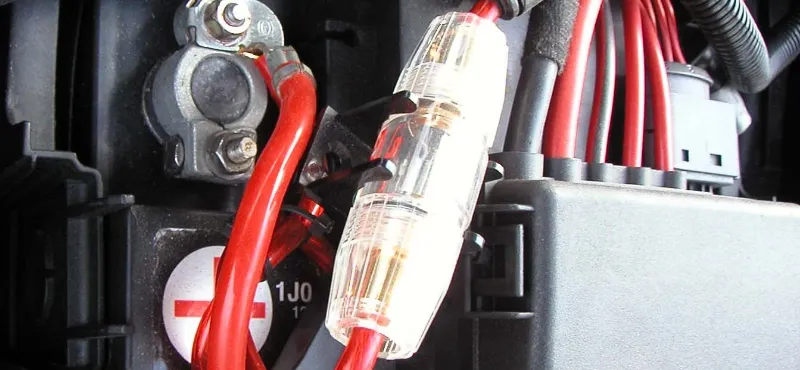A fuse is a safety device that protects an electric circuit in case of excessive current.
A car amplifier requires a good amount of current to work. For this, it’s connected to the battery through the power wire.
If this wire somehow touches the ground (body of the vehicle), it’ll create a short circuit. The short circuit will cause a huge amount of current to flow. Since this amount will be much more than what the power wire is designed to handle, it’ll start to get hot until the point where it catches fire.
Since the vehicles already have a tank full of fuel, any sort of fire can be dangerous for you and your vehicle.
However, if there was a fuse installed, it would’ve blown itself in case of excessive current and protect the rest of your wiring.
Hence, to avoid such a hazardous situation, we’ll have to place a fuse between the battery and the amplifier. Ideally, you should install it as closer to the battery as you can. So that less wire is damaged in case of a short circuit.
Do I Need a Car Amp Fuse?
Some people believe that they don’t need an external fuse because their amplifier already has one built-in.
This is not true because the amplifier’s built-in amp is designed to only protect the amplifier, not the whole wiring.
What Fuse Size Should I Use For My Amp?
- T-Spec V8 mini-ANL 60A (best fuse for 500 watt Class AB amp)
- T-Spec V8 mini-ANL 40A (best fuse for 500 watt Class D amp)
- T-Spec V8 ANL 150A (best fuse for 1000 watt Class AB amp)
- KnuKonceptz Mini-ANL 80A (best fuse for 1000 watt Class D amp)
- A.A ANL 175A (best fuse for 1200 watt Class AB amp)
- Rockford Fosgate 100A Maxi (best fuse for 1200 watt Class D amp)
Amp Fuse Size Formula
So now that we’ve talked about how important a fuse is for your car audio system, let’s talk about how to choose one.
You just can’t buy any fuse online and put it into your vehicle. Doing so will cause more harm than good.
Many car amplifiers come with a fuse rating which you can find in the specs sheet. This rating indicates the suitable fuse size we should use for our circuit.
If it’s not listed on your amp, we will have to find it by ourselves using this simple equation: I=P/V, where P is the Amplifier’s Power (in watts) and V is the system voltage at 14.4 Volts.
So, if we have a 1000-Watt amplifier such as JL Audio’s JD1000/1, the value of P will be 1000. In case you have multiple amps connected, the value of P will be the sum of their power ratings.
Before plugging our final Power value into the main equation, however, we’ll have to consider the efficiency factor as well. Since we have a class D amplifier (they have 80% efficiency), we’ll divide its power value by 0.8 to get the actual power value, i.e: 1250 Watts (1000/0.8=1250).
By putting this into our main equation, we’ll get 1250/14.4=86.8 A.
There’s no 86.8 A car fuse, however. So we’ll use one that’s closest to this value, which is 80 A.
Frequently Asked Questions
Below are recommended fuse sizes for different amplifiers.
What Size of Fuse for 300 watt Amp?
A 300-watt amp will need a 30A fuse if it’s a class D or a 40A fuse if it’s a class AB.
What Size of Fuse for 500 watt Amp?
A 500-watt amp will need a 40A fuse if it’s a class D or a 80A fuse if it’s a class AB.
What Size of Fuse for 600 watt Amp?
A 600-watt amp will need a 50A fuse if it’s a class D or an 80A fuse if it’s a class AB.
What Size of Fuse for 700 watt Amp?
A 700-watt amp will need a 60A fuse if it’s a class D or a 100A fuse if it’s a class AB.
What Size of Fuse for 1000 watt Amp?
A 1000-watt amp will need an 80A fuse if it’s a class D or a 150A fuse if it’s a class AB.
What Size of Fuse for a 1200 watt Amp?
A 1200-watt amp will need a 100A fuse if it’s a class D or a 175A fuse if it’s a class AB.
What Size of Fuse for 2000 watt Amp?
A 2000-watt amp will need a 200A fuse if it’s a class D or a 300A fuse if it’s a class AB.
